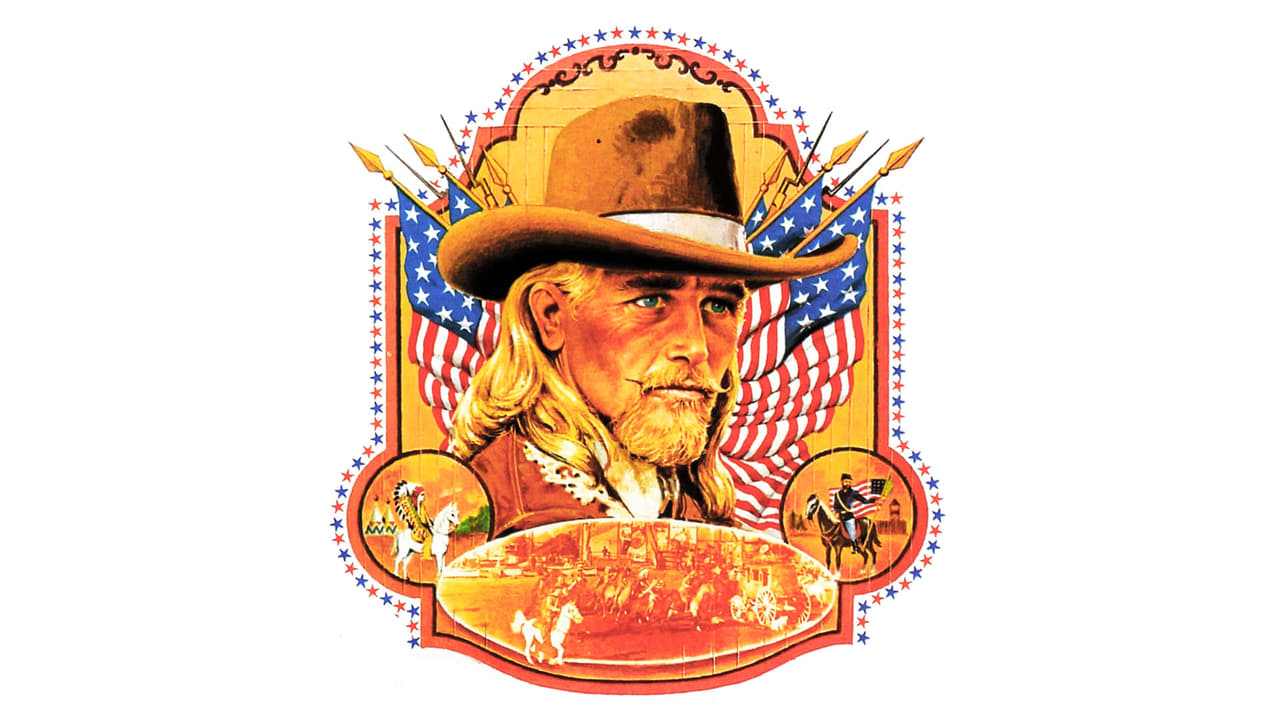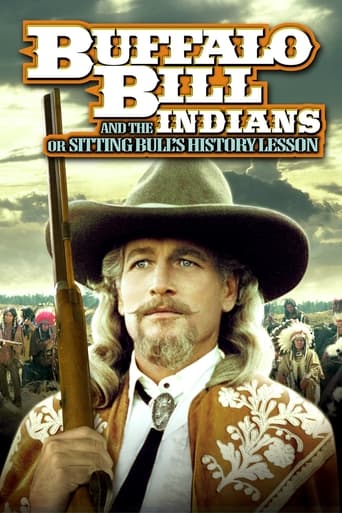

A good many movies are misjudged at the time of their release--sometimes overpraised, such as DeMille's elephantine The Greatest Show On Earth, and sometimes undervalued or not valued at all, such as this oddball revisionist Western. Director Altman had just finished Nashville, and folks expected another blockbuster that wove a wide tapestry of the modern world; Paul Newman was churning out rather bloodless blockbusters like The Towering Inferno, and nobody expected a commitment to a wild west character who lives a dark lie. Many reviews of this film are appropriately appreciative of its quirks, not expecting a traditional western, but accustomed to the oddities of Altman's usual style. This film is jammed with wonderful character portrayals, and not only gives a willing viewer a fascinating look at what traveling vaudeville was like in the old West, but tosses out some food for thought. Though towards the end it betrays its theatre origins with some talky excess, I found Buffalo Bill colorful, entertaining and unusually satisfying
... View MoreI was not particularly fond of "Buffalo Bill and the Indians" when I saw it in the theater in 1976. I found the story ponderous and the cinematography rather difficult to handle. When the movie was first released in 1976, quite a bit of controversy surrounded the washed out color and hazy yellow filter Altman had used to film the movie. I believe the intention was to make the movie look like a faded photograph. The final effect, at least to my eyes, was the equivalent of watching the film through yellow tinted sunglasses that were very, very dirty. I simply did not care for it. Nonetheless I couldn't deny it had made a strong impact on the feel of the film. I recently watched the movie in HD on cable and was shocked to see that the hazy yellow filter that once colored the entire film was gone. The story was still ponderous but the images were as brightly colored as if they had been filmed for a TV movie. The image was much easier to watch but it caused me concern. By removing the filter, MGM had completely changed the feel of the film. Even though I hadn't liked it, this was no longer the movie that Altman had intended. It was like colorizing a black and white film. I know that the movie was re-edited by Dino de Laurentis for European release and that Altman had denounced the changes that had been made. Perhaps the removal of the filter was made for this re-edited international version. I really don't know because I never saw it, but if it was, it should be restored to the original for modern distribution. I find this a troubling precedent for the release of experimental films like this for DVD. The audience can no longer experience the film as it was intended. I can only hope that when the film is released on Blu-Ray they will allow the option of watching the film both with and without the filter Altman intended. As strange a failure as it was for a seasoned director like Altman to make, the look of "Buffalo Bill" and the Indians should be preserved as he had intended it.
... View MoreMy title quote is something that Paul Newman remarks as Buffalo Bill when he decides he's going to camp out one night and forgo the pleasures of bed and the ladies who clamored to inhabit his. William F. Cody certainly had his share of what we'd now consider groupies, but on that night he felt a need to get back to his roots.The reason why Buffalo Bill sustained an enduring popularity was because he really did have a background that was colorful and exciting. He was a kid raised in Nebraska frontier territory who ran away to escape hard times and was one of the young riders for the short lived and legendary pony express. He had real exploits in that, as a buffalo hunter (hence the name)and an army scout. He won the Congressional Medal of Honor and did kill Cheyenne Chief Yellow Hand in single combat. But a lot of people in those days could have shown similar resumes. What set Cody apart was his discovery by Ned Buntline who wrote those dime novels who created all the mythology around him. Buntline was in need of a new hero, his previous literary Parsifal Wild Bill Hickok had fallen out with him. Buntline later wrote about Wyatt Earp, Jesse James, Billy the Kid, just about every colorful character our old west produced. His dime novels for better or worse created the characters.The greatest weakness in the film is Burt Lancaster's portrayal of Buntline. Not taking anything away from Lancaster because I'm sure he was taking direction and working within the parameters of the script and the original Broadway play Indians upon which Buffalo Bill and the Indians is based. But Lancaster plays it like the elderly Robert Stroud. The real Buntline was more like Elmer Gantry.Paul Newman as Cody however gives one of the best interpretations of Buffalo Bill seen on film. He's a man trapped in his own legend, but he's smart enough to know what's real and what's phony in his world, including himself. He knows behind all the ballyhoo and hoopla of his Wild West Show, there's a man who did not always know ease and comfort.The original play Indians ran for 96 performances on Broadway and starred Stacy Keach as Cody. It was far more involved and had Hickok, Billy the Kid, and Jesse James as characters. Author Arthur Koppit trimmed it down so it had more coherency for the screen.As we know from Annie Get Your Gun, Sitting Bull was briefly part of Cody's Wild West Show. But here the attention is focused on Frank Kaquitts who in his one and only film plays an impassive Sitting Bull, who's doing Cody's show to gain food and supply from the government for his people. In fact Cody now the total show business creation is more impressed with Will Sampson who's well over six feet tall and is better typecast as the savage Indian. There's nothing terribly savage about either of them now.Look for good performances from Geraldine Chaplin as Annie Oakley who in real life as well as in Annie Get Your Gun befriended Sitting Bull and from Joel Grey as Nate Salisbury, Cody's business partner and Kevin McCarthy as John Burke, the publicist for the Wild West Show. They continued what Buntline started in creating the Buffalo Bill mythology.Buffalo Bill and the Indians is not the best film of Robert Altman or Paul Newman. It's certainly a lot better than the science fiction film Quintet that they did later. It's a good study of how in America our western mythology got its start.
... View MoreFor a student of history like myself, I believe it was no accident that Altman made this movie in 1976, on the Stoney Reservation in Alberta, Canada. We look back and remember what happened 100 years earlier in 1876, the annihilation of Custer and his 7th Cavalry at the Little Big Horn by the Sioux under Sitting Bull, Crazy Horse and other prominent Indian leaders, in defense of their homeland and families. The movie hits at the establishment of the time, Sitting Bull has dreamed of meeting Pres Cleveland to make a request on behalf of his people, but he was snubbed by the great white chief, who would not say one word without referring to his aides. The amicable relations between Annie Oakley and Bull were well known, and when he was killed at the Standing Rock agency, she cried for him and his people. Crazy Horse had died in similar circumstances trying to escape. Big Foot and his small band in 1890 at Wounded Knee completed the tragedy of those times and attitudes. It is only very recently, the name of the Custer Battlefield has been changed to the Little Big Horn battlefield. So Altman's movie in 1976 was ahead of its time, both funny and intelligent in its truths. William Cody the scout had himself killed hundreds of buffalo, and he knew a big ticket attraction to his show when he saw one, the remainder of the title "or Sitting Bull's History lesson" is also very meaningful. Sitting Bull's dreams told him what was to come, the end to a way of life on the plains. On the other hand, as several reviewers have noted, the look of fear in Cody's eyes in the closing sequence says it all. And Altman got them all together for their roles, Paul Newman, Burt Lancaster, Harvey Keitel, Kevin McCarthy, Geraldine Chapman, Will Sampson, Joel Grey. Not your average Western, but more subtly entertaining than most. Comment from Malcolm in Toronto, 26th August 2007
... View More